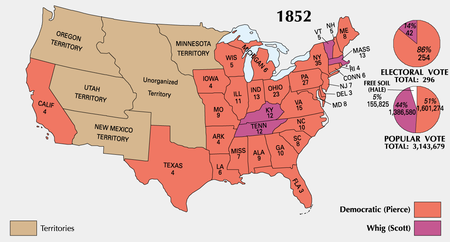U.S. presidential election, 1852
|
|
The U.S. presidential election of 1852 was in many ways a replay of the election of 1844. Once again, the incumbent President was a Whig who had succeeded to the presidency upon the death of his war hero predecessor; in this case, it was Millard Fillmore who followed General Zachary Taylor. Once again, the Whig party would pass over the incumbent for nomination. Once again, the Democrats would nominate a dark horse candidate, this time Franklin Pierce. Once again, the Whigs would campaign on the obscurity of the Democratic candidate. And once again, this strategy backfired.
Pierce and running mate William King would go on to win what was at the time one of the nation's largest electoral victories, trouncing Scott and his vice presidential nominee, William Graham of North Carolina, 254 electoral votes to 42.
| Contents [hide] |
Nominations
Whig Party nomination
The Whigs, seeking the second coming of Zachary Taylor, pushed aside President Fillmore in a 159-133 delegate vote in favor of another Mexican War general with a heroic record, General Winfield Scott of Virginia. Scott had earned the nickname of "Old Fuss and Feathers" due to his insistence on military appearance and discipline, and while respected was also seen by the people as somewhat foppish. William Alexander Graham was chosen as the Vice Presidential nominee with no substantive opposition.
Democratic Party nomination
The Democrats, anticipating a loss in the general election but not wanting to re-nominate 1848 nominee Lewis Cass, instead nominated the then virtually unknown Franklin Pierce of New Hampshire. Pierce was a former Congressman and Senator known as much for his alcoholic tendencies as much as his statesmanship.
General election
Campaign
The Whigs' platform was almost indistinguishible from that of the Democrats, reducing the campaign to a contest between the personalities of the two candidates. This helped drive down the turnout rates in the election to their lowest level since 1836. The turnout drop was also helped along by Scott's anti-slavery reputation, which decimated the Southern Whig vote, while the pro-slavery Whig platform hurt the Northern Whig vote. Finally, Scott's war hero reputation was somewhat blunted by the fact that Pierce was himself a Mexican War brigadier general. These factors added up to a thorough drubbing for Scott, who lost every state except Kentucky, Tennessee, Massachusetts, and Vermont.
Results
Template:Start U.S. presidential ticket box
Template:U.S. presidential ticket box row
Template:U.S. presidential ticket box row
Template:U.S. presidential ticket box row
Template:End U.S. presidential ticket box
(a) The popular vote figures exclude South Carolina where the Electors were chosen by the state legislature rather than by popular vote.
(b) Template:U.S. popular vote total disclaimer
See also
Template:Uspresidentialelections
References
Book
- Holt, Michael F. The Rise and Fall of the American Whig Party: Jacksonian Politics and the Onset of the Civil War. Oxford University Press, New York, New York: 1999.
External link
- 1852 state-by-state popular vote (http://www.multied.com/elections/1852Pop.html)

